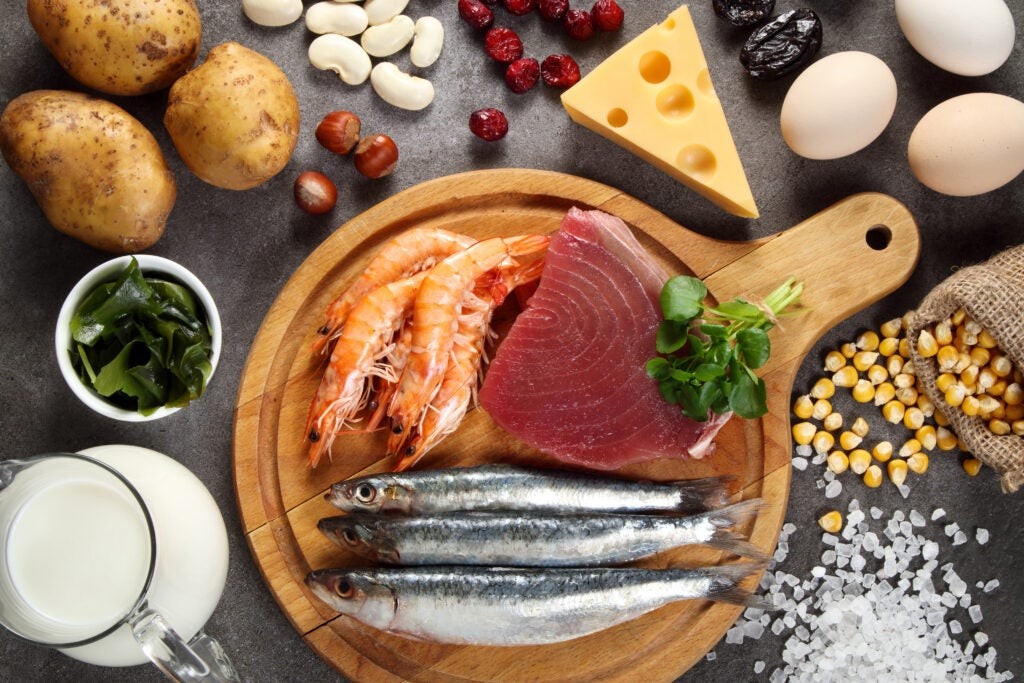Iodine is an essential nutrient, and understanding What Foods Naturally Have Iodine is crucial for maintaining optimal health, especially thyroid function. Foods.edu.vn is here to guide you through the best dietary sources of this vital mineral, ensuring you make informed choices. Knowing the natural iodine sources is a great way to ensure you meet your daily needs through proper nutrition, prevent iodine deficiency disorders, and support overall well-being.
1. Why Is Iodine Important?
Iodine plays a vital role in the human body, primarily supporting thyroid hormone production. These hormones regulate metabolism, growth, and development. Let’s delve into the specifics:
1.1. Role in Thyroid Hormone Production
The thyroid gland uses iodine to produce two main hormones: thyroxine (T4) and triiodothyronine (T3). These hormones are essential for:
- Metabolic Regulation: T3 and T4 regulate the body’s metabolic rate, influencing how quickly the body uses energy.
- Growth and Development: Crucial for brain and bone development, particularly during infancy and pregnancy.
- Body Temperature: Helps maintain a stable body temperature.
- Heart Rate: Influences heart rate and blood pressure.
1.2. Health Consequences of Iodine Deficiency
Iodine deficiency can lead to several health issues, including:
- Hypothyroidism: An underactive thyroid, leading to fatigue, weight gain, and depression.
- Goiter: Enlargement of the thyroid gland due to its attempt to capture more iodine from the blood.
- Developmental Issues: In pregnant women, deficiency can cause miscarriage, stillbirth, and impaired fetal brain development.
- Cognitive Impairment: In children, it can lead to lower IQ and learning disabilities. A study by Zimmermann et al. (2006) in The American Journal of Clinical Nutrition highlighted that iodine supplementation significantly improves cognitive functions in iodine-deficient children.
1.3. Recommended Daily Intake of Iodine
Ensuring adequate iodine intake is crucial for maintaining optimal health. The recommended daily allowances (RDA) vary based on age and life stage:
| Group | Recommended Daily Intake (mcg) |
|---|---|
| Adults (19+ years) | 150 |
| Pregnant Women | 220 |
| Breastfeeding Women | 290 |
| Children (9-13 years) | 120 |
| Children (1-8 years) | 90 |
Meeting these requirements helps prevent deficiency-related health issues and supports overall well-being.
2. Top Natural Food Sources of Iodine
Several foods naturally contain iodine, making it easier to incorporate this essential mineral into your diet. Here are some of the best sources:
2.1. Seaweed
 Various types of iodine-rich seaweed, including kelp, nori, and wakame, showcasing their diverse forms and textures
Various types of iodine-rich seaweed, including kelp, nori, and wakame, showcasing their diverse forms and textures
Seaweed is one of the richest natural sources of iodine. Different types of seaweed contain varying amounts:
- Kelp: Exceptionally high in iodine, with some varieties containing thousands of micrograms per serving.
- Nori: Commonly used in sushi, contains a moderate amount of iodine.
- Wakame: Another good source, often used in salads and soups.
According to a study published in the British Journal of Nutrition, seaweed consumption can significantly improve iodine status, but moderation is key to avoid excessive intake.
2.2. Dairy Products
Dairy products like milk, cheese, and yogurt can be good sources of iodine, especially in countries where iodine is added to cattle feed.
- Milk: The iodine content in milk can vary based on the iodine content of the cow’s diet.
- Yogurt: A serving of yogurt can contribute significantly to your daily iodine needs.
- Cheese: Certain cheeses, like cheddar and mozzarella, contain notable amounts of iodine.
2.3. Fish and Seafood
Several types of fish and seafood are excellent sources of iodine:
- Cod: A lean white fish that provides a good amount of iodine per serving.
- Tuna: Canned tuna can be a convenient and affordable source of iodine.
- Shrimp: Contains a decent amount of iodine and is a versatile seafood option.
- Oysters: Rich in iodine and other essential nutrients.
2.4. Eggs
Eggs are a convenient source of iodine, with most of the iodine concentrated in the yolk.
- Chicken Eggs: Depending on the hen’s diet, eggs can provide a significant portion of your daily iodine needs.
- Duck Eggs: May contain slightly higher levels of iodine compared to chicken eggs.
2.5. Iodized Salt
Iodized salt is a common source of iodine in many countries. The process of adding iodine to salt has significantly reduced iodine deficiency worldwide.
- Table Salt: Ensure the label indicates that the salt is iodized.
- Sea Salt: May contain trace amounts of iodine, but not consistently enough to meet daily requirements unless it is iodized.
2.6. Other Sources
While the above-mentioned foods are the primary sources, other foods also contain smaller amounts of iodine:
- Fortified Foods: Some breads and cereals are fortified with iodine.
- Fruits and Vegetables: Iodine content can vary depending on the soil in which they are grown.
3. Maximizing Iodine Intake Through Diet
To ensure you’re getting enough iodine, consider these dietary strategies:
3.1. Incorporating Seaweed into Your Diet
- Sushi: Nori seaweed is a staple in sushi rolls, providing a tasty and convenient way to consume iodine.
- Seaweed Snacks: Roasted seaweed snacks are a crunchy and nutritious option.
- Soups and Salads: Add wakame or kombu to soups and salads for an extra iodine boost.
- Kelp Noodles: Use kelp noodles as a low-carb alternative to traditional pasta.
3.2. Balancing Dairy Consumption
- Milk: Include a glass of milk in your daily diet, whether it’s cow’s milk or a fortified plant-based alternative.
- Yogurt: Choose yogurt as a healthy snack or breakfast option.
- Cheese: Add cheese to your meals in moderation, keeping in mind its iodine content.
3.3. Choosing the Right Seafood
- Variety is Key: Consume a variety of fish and seafood to ensure a balanced intake of iodine and other essential nutrients.
- Sustainable Choices: Opt for sustainably sourced seafood to protect marine ecosystems.
3.4. Using Iodized Salt Wisely
- Check Labels: Always check the label to ensure your table salt is iodized.
- Proper Storage: Store iodized salt in an airtight container away from heat and light to preserve its iodine content.
3.5. Cooking Methods
- Gentle Cooking: Use gentle cooking methods like steaming or poaching to preserve iodine content in foods.
- Avoid Overcooking: Overcooking can reduce the iodine content in some foods.
4. Iodine Supplements: When Are They Necessary?
While obtaining iodine through diet is ideal, supplements may be necessary in certain situations:
4.1. Who Might Need Supplements?
- Pregnant Women: Due to increased iodine requirements during pregnancy.
- Vegans and Vegetarians: Those who avoid animal products may have difficulty obtaining enough iodine through diet alone.
- People with Limited Access to Iodized Salt: In regions where iodized salt is not readily available.
- Individuals with Certain Medical Conditions: Such as thyroid disorders or those taking medications that interfere with iodine absorption.
4.2. Types of Iodine Supplements
- Potassium Iodide: A common form of iodine supplement.
- Potassium Iodate: Another form, often found in dietary supplements.
- Seaweed-Based Supplements: Made from dried seaweed, providing a natural source of iodine.
4.3. Dosage Considerations
- Follow Recommendations: Always follow the recommended dosage on the supplement label or as advised by a healthcare professional.
- Avoid Overdosing: Excessive iodine intake can lead to adverse effects, so it’s essential to stay within the recommended limits. The Tolerable Upper Intake Level (UL) for adults is 1,100 mcg per day.
4.4. Consulting Healthcare Professionals
- Personalized Advice: Consult with a healthcare provider or registered dietitian before starting any iodine supplement, especially if you have underlying health conditions or are taking other medications.
- Monitoring Iodine Levels: Regular monitoring of iodine levels can help ensure you’re getting the right amount without exceeding safe limits.
5. Potential Risks of Excessive Iodine Intake
While iodine is essential, consuming too much can lead to health problems:
5.1. Hyperthyroidism
- Overproduction of Thyroid Hormones: Excessive iodine can cause the thyroid gland to produce too much thyroid hormone, leading to hyperthyroidism.
- Symptoms: Symptoms include weight loss, rapid heartbeat, anxiety, and tremors.
5.2. Thyroiditis
- Inflammation of the Thyroid Gland: High iodine intake can trigger inflammation of the thyroid gland, known as thyroiditis.
- Hashimoto’s Thyroiditis: In susceptible individuals, excessive iodine can exacerbate autoimmune thyroid conditions like Hashimoto’s thyroiditis.
5.3. Goiter
- Paradoxical Effect: Although iodine deficiency is a common cause of goiter, excessive iodine intake can also lead to goiter in some individuals.
5.4. Other Adverse Effects
- Iodine-Induced Autoimmunity: High iodine intake has been linked to the development of autoimmune thyroid disorders in some studies.
- Digestive Issues: Some people may experience digestive upset, such as nausea and diarrhea, with high doses of iodine.
5.5. Precautions and Recommendations
- Moderation: Consume iodine-rich foods in moderation to avoid excessive intake.
- Awareness: Be aware of the iodine content in supplements and fortified foods.
- Monitoring: Regularly monitor thyroid function, especially if you have a history of thyroid disorders.
6. Iodine and Specific Populations
Certain populations have unique iodine needs and considerations:
6.1. Pregnant and Breastfeeding Women
- Increased Requirements: Iodine requirements increase during pregnancy and breastfeeding to support fetal and infant development.
- Supplementation: Supplementation is often recommended to ensure adequate intake.
- Monitoring: Regular monitoring of iodine levels is crucial to prevent deficiency and toxicity.
6.2. Infants and Children
- Critical for Development: Iodine is critical for brain and neurological development in infants and children.
- Sources: Breast milk or fortified infant formula are primary sources of iodine for infants.
- Dietary Considerations: As children grow, ensure they consume iodine-rich foods like dairy products, eggs, and iodized salt.
6.3. Vegans and Vegetarians
- Potential Deficiency: Vegans and vegetarians may be at higher risk of iodine deficiency due to limited intake of animal products.
- Seaweed and Iodized Salt: Emphasize seaweed and iodized salt in the diet.
- Fortified Foods: Consider fortified plant-based milk alternatives and cereals.
6.4. Individuals with Thyroid Disorders
- Consultation: Consult with a healthcare provider or endocrinologist to determine appropriate iodine intake.
- Monitoring: Regular monitoring of thyroid function is essential to manage thyroid disorders.
- Dietary Adjustments: Dietary adjustments may be necessary based on the specific thyroid condition and treatment plan.
7. Debunking Common Myths About Iodine
There are several misconceptions about iodine that need clarification:
7.1. Myth: Sea Salt Provides Enough Iodine
- Fact: Sea salt typically contains only trace amounts of iodine, which is insufficient to meet daily requirements unless it is iodized.
7.2. Myth: Everyone Should Take Iodine Supplements
- Fact: Supplementation is not necessary for everyone and should be based on individual needs and dietary intake.
- Diet First: Prioritize obtaining iodine through diet whenever possible.
7.3. Myth: Iodine is Only Important for Thyroid Function
- Fact: While iodine is crucial for thyroid function, it also plays a role in other bodily processes, including immune function and antioxidant defense.
7.4. Myth: High Iodine Intake is Always Safe
- Fact: Excessive iodine intake can lead to adverse effects, especially in susceptible individuals with thyroid disorders.
- Moderation: Moderation is key to maintaining optimal iodine levels.
8. Latest Research and Trends in Iodine Nutrition
Staying updated on the latest research and trends in iodine nutrition is essential for making informed dietary choices:
8.1. Emerging Research on Iodine and Cognitive Function
- Cognitive Benefits: Recent studies have highlighted the importance of adequate iodine intake for cognitive function, especially in children and the elderly.
- Supplementation Studies: Research continues to explore the effects of iodine supplementation on cognitive performance and neurological development.
8.2. Trends in Food Fortification
- Global Initiatives: Global initiatives are focusing on food fortification strategies to address iodine deficiency in vulnerable populations.
- Fortified Foods: New fortified foods and supplements are being developed to improve iodine status worldwide.
8.3. Sustainable Seaweed Farming
- Sustainable Practices: Sustainable seaweed farming practices are gaining traction to ensure a reliable and environmentally friendly source of iodine.
- Environmental Benefits: Seaweed farming can also contribute to carbon sequestration and marine ecosystem health.
9. Practical Tips for Maintaining Healthy Iodine Levels
Here are some actionable tips to help you maintain healthy iodine levels:
9.1. Read Food Labels Carefully
- Iodized Salt: Check the labels of table salt to ensure it is iodized.
- Fortified Foods: Look for fortified foods like cereals and plant-based milk alternatives.
9.2. Incorporate Iodine-Rich Foods into Your Diet
- Variety: Include a variety of iodine-rich foods like seaweed, dairy products, eggs, and seafood in your weekly meal plan.
9.3. Use Iodized Salt in Cooking
- Seasoning: Use iodized salt as your primary seasoning for cooking and baking.
- Storage: Store iodized salt in an airtight container away from heat and light.
9.4. Consult with Healthcare Professionals
- Personalized Advice: Consult with a healthcare provider or registered dietitian for personalized advice on iodine intake.
- Monitoring: Regularly monitor thyroid function and iodine levels, especially if you have underlying health conditions.
10. Frequently Asked Questions (FAQs) About Dietary Iodine
Here are some common questions about dietary iodine:
10.1. What are the early signs of iodine deficiency?
Early signs include fatigue, weight gain, constipation, and difficulty concentrating. A goiter may also develop.
10.2. Can I get enough iodine from a multivitamin?
Not all multivitamins contain iodine, so check the label to ensure it provides an adequate amount.
10.3. Is it safe to eat seaweed every day?
While seaweed is a good source of iodine, consuming it in excess can lead to high iodine intake. Moderation is key.
10.4. How does cooking affect the iodine content of food?
Boiling foods can reduce their iodine content, while steaming or poaching helps preserve it.
10.5. Are there any foods that interfere with iodine absorption?
Certain foods, called goitrogens, can interfere with iodine absorption. These include cruciferous vegetables like broccoli, cabbage, and kale. Cooking these vegetables can reduce their goitrogenic effects.
10.6. Can iodine supplements interact with medications?
Yes, iodine supplements can interact with certain medications, including those for high blood pressure and thyroid disorders. Consult with a healthcare provider before taking iodine supplements.
10.7. What is the best way to store iodized salt to preserve its iodine content?
Store iodized salt in an airtight container away from heat and light.
10.8. Can children get too much iodine from their diet?
While it is possible for children to consume excessive iodine, it is relatively rare. Ensure they consume a balanced diet with a variety of iodine-rich foods in moderation.
10.9. How often should I have my iodine levels checked?
The frequency of iodine level checks depends on individual health status and risk factors. Consult with a healthcare provider for personalized recommendations.
10.10. What are the best plant-based sources of iodine for vegans?
Seaweed and iodized salt are the best plant-based sources of iodine for vegans. Fortified plant-based milk alternatives may also contribute to iodine intake.
Understanding what foods naturally have iodine and how to incorporate them into your diet is essential for maintaining optimal health. At FOODS.EDU.VN, we’re committed to providing you with comprehensive and reliable information to help you make informed dietary choices. From detailed guides on nutrient-rich foods to the latest research in nutrition science, we’ve got you covered.
Ready to dive deeper into the world of nutrition and healthy eating?
Visit FOODS.EDU.VN today and explore a wealth of articles, recipes, and expert advice. Whether you’re looking to improve your diet, manage a specific health condition, or simply learn more about the foods you eat, our platform offers the resources you need to succeed.
Don’t miss out on the opportunity to transform your health and well-being!
- Explore our extensive library of articles and guides.
- Discover delicious and nutritious recipes.
- Connect with a community of like-minded individuals.
Take the first step towards a healthier you – visit FOODS.EDU.VN now!
For further assistance, feel free to reach out to us at:
- Address: 1946 Campus Dr, Hyde Park, NY 12538, United States
- WhatsApp: +1 845-452-9600
- Website: FOODS.EDU.VN
Let foods.edu.vn be your trusted partner on your journey to better health and nutrition.

